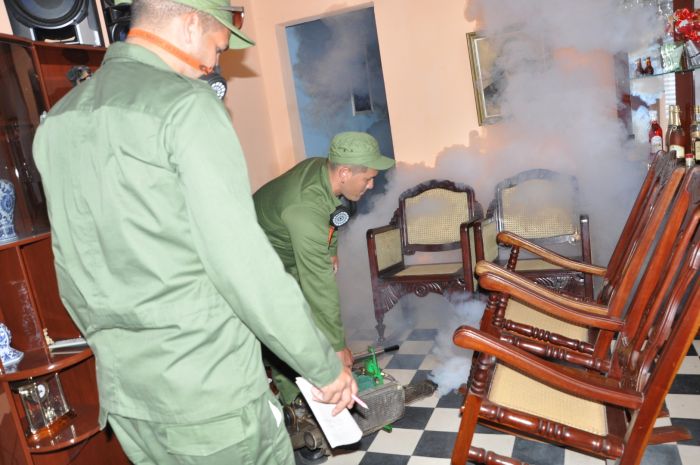 The President of the Councils of State and Ministers, Raúl Castro Ruz, addresses measures to prevent the introduction and spreading of Zika in Cuba
The President of the Councils of State and Ministers, Raúl Castro Ruz, addresses measures to prevent the introduction and spreading of Zika in Cuba
As it’s known by our people, the World Health Organization has warned of the rapid spreading of the Zika virus, affecting 32 countries on our continent, and has declared an international health emergency.
Although scientific evidence has not demonstrated that a Zika virus infection during pregnancy causes microcephaly, in all cases reported in affected countries, a strong link with an increase in this birth defect, yes, has been found.
The disease is spread by mosquitoes from the genus Aedes. There is currently no vaccine or treatment for the illness, therefore the best way to prevent it is to eliminate or reduce the vector’s presence, and protect ourselves from these insect bites.
To date, no cases have been detected in our country, although all cases of non-specific fever symptoms are being monitored and studied to identify the presence of the virus early on, and international sanitary controls are being intensified. If anyone with the virus is found, all conditions are in place to provide qualified medical assistance.
Cuba has undertaken intense efforts to reduce the vector’s presence, with the objective of maintaining its presence at levels which do not represent a danger.
Nevertheless, factors related to inadequate technical quality of anti-vectoral work, poor environmental sanitation, and adverse weather conditions have contributed to the risk of diseases spreading.
Given this situation, the Party and government leadership have adopted a plan of action, under the direction of the Ministry of Public Health, to confront the Zika virus, and consequently dengue and Chikungunya, as well.
Once again, the true leadership of the struggle against the threat of an epidemic is the responsibility of our entire people, since their conscious participation is indispensable if this important and necessary task is to be successful.
Urgently needed are intensive sanitation programs in workplaces, residential areas, and inside homes themselves, with the active collaboration of community bodies and grassroots organizations.
It is imperative that every Cuban man and woman assume this battle as a personal issue, a worrisome problem, given above all the responsibility it implies for their families.
As part of the approved action plan, the Revolutionary Armed Forces is assigning more than 9,000 troops, including permanent and reserve officers, as well as technical equipment to reinforce anti-vectorial and sanitation efforts, with the additional support of 200 Revolutionary National Police officers.
At this time, it is imperative that all citizens and entities strictly comply with sanitation norms and measures adopted to guarantee anti-vectorial efforts, to avoid contributing to the spreading of epidemics, or other behaviours which promote or constitute a threat to public health.
Following this intensive stage, a plan must be implemented which is sustainable over time, that does not become just another campaign, to guarantee that levels of infestation are minimal.
As has been the case on other occasions, our people will be able to show their capacity for organization, to maintain the levels of health reached by the Revolution, and thus avoid suffering for our families. More than ever before in similar efforts, it is imperative to be more disciplined and exacting.
 Escambray ENGLISH EDITION
Escambray ENGLISH EDITION





Escambray reserves the right to publish comments.